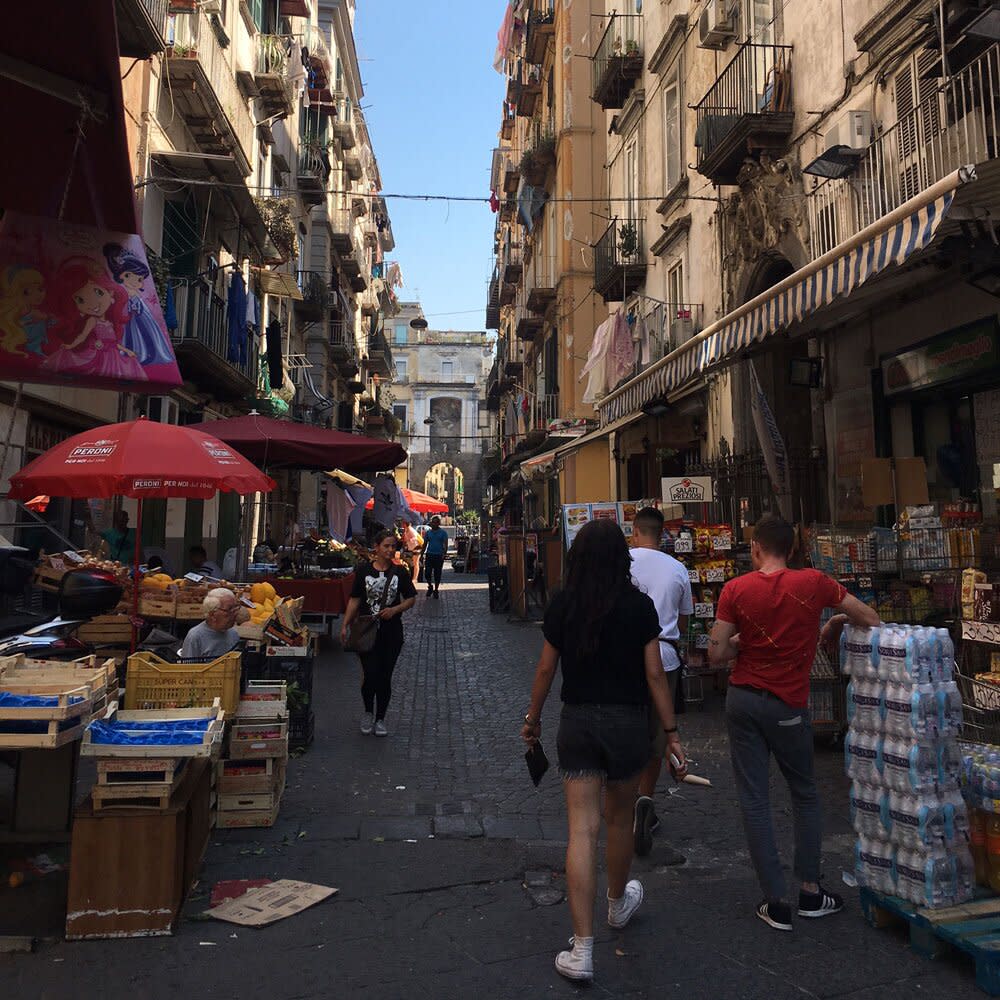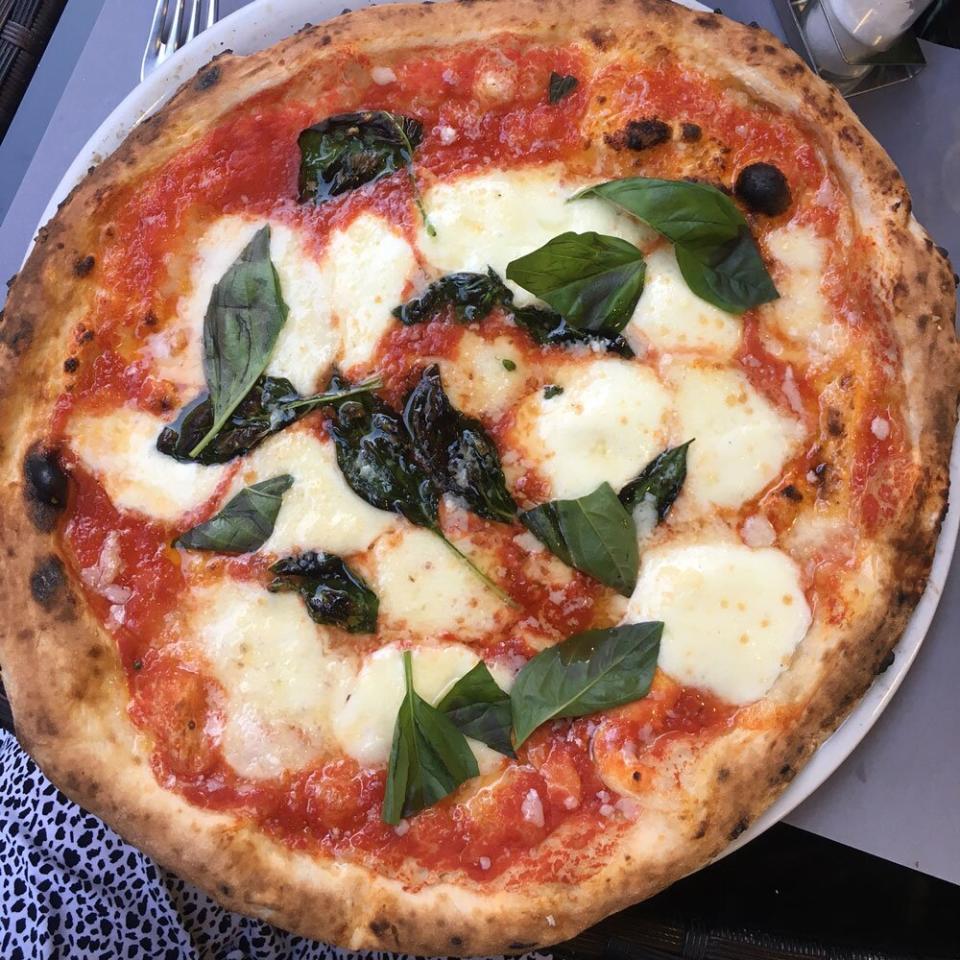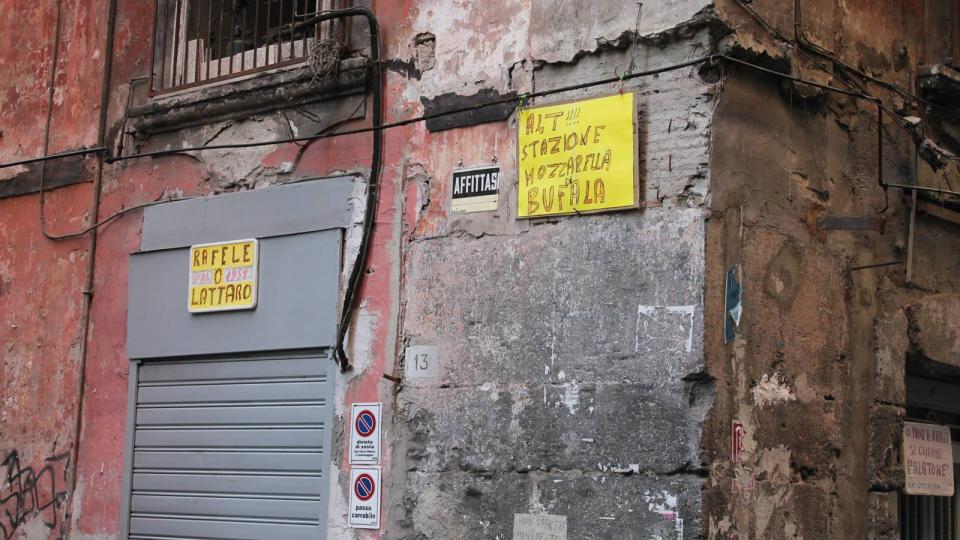Why You Should Love Naples: An Ode to a Frenetic City

Maria Yagoda
"Everyone is always screaming, and there's a lot of trash, but…" is how most of my sentences about Naples, my favorite city, begin. My grandfather, Luigi Simeone, was born in Gaeta, a seaside town just an hour away by train, and even he wouldn't visit the city. When I tell Americans about my months-long stays in Naples and urge them to visit, they raise concerns about pickpocketing, mob activity and noise. "But I loved the Elena Ferrante novels," they'll often add.
They are not wrong about the noise. I am not exaggerating when I say that there is no silence in Naples. Not in churches, not in alleys and certainly not at six in the morning, when garbage trucks make their rounds, and dogs settle their scores. The first night I attempted sleep in Naples, sounds wafted through my apartment window: screaming cats, scooters, a group of shirtless men singing "Summer of '69," a family washing dinner dishes and at least four heated arguments, all of which seemed to be food-related. I hobbled out onto my tiny balcony, resisting the urge to scream and throw clothespins into the windows across the alley. Instead, I sat. The streets of the crumbling Quartieri Spagnoli are so narrow that from any balcony, you can see into ten different homes on five different floors. Because of the heat, windows remain open, so not only do you watch other people's business, you hear and smell it, too. It usually smells like garlic and charred pizza crust.

Maria Yagoda
In Naples, there is no notion of outside or inside, public or private. People bring their living rooms to the streets, assembling tables and chairs outside of their homes, where they'll sit all day as scooters and purse-clutching tourists swerve around them. When you walk the cobble-stoned streets, you weave in and out of dogs, babies, chairs and motorcycles, trying to catch glimpses of the city's countless breathtaking yet poorly preserved churches while avoiding injury. One slight turn of the head, and you might see an entire family eating zuppa di cozze (mussel soup) around a table, while an old woman naps on a bed in the same room. There isn't much space here, and often, one room must fit three generations, beds, a table and a full kitchen, all visible through one large, open window. Kids, with only tiny portions of streets to play on, become innovators of space. Gangs of spikey-haired seven year olds invent complicated soccer games using the corner of a bank and three benches.
Yet there seems to be no lack of room for the elderly, the dominant demographic of the city's outdoor spaces. Parked on stoops or plastic chairs outside their homes, dolling out 'ciaos' to people passing by, the elderly run the streets. Typically, they assemble in packs. Visit any piazza in the Campania region—before noon or after 5 p.m. when they've risen from naps—and you'll find clusters of them, on benches or stairs, playing cards and gossiping with the same friend groups they've had since grade school. When you walk the streets, you're on their turf, so anonymity is a privilege you must instantly relinquish. Here, strangers become family—the street, your living room. If you accept the noise, the grit and the chaos of "outside," you might soon claim it as your own. One afternoon, while lugging groceries up the street, I noticed I had a spectator: a short white-haired woman sitting outside on a plastic chair. She was wearing a large floral shift dress, her toes painted Valentine red, and she watched me as I panted and wiped my face with my t-shirt. During the months that I lived in Naples in 2013, I'd grown accustomed to being watched, particularly by people over 60. Once, an old man in a suit and feathered cap approached me at the bar and said, "I saw you buying groceries yesterday at 1 p.m. Gatorade and iced tea and potato chips. Why?"
This woman, Maria, looked kind; her inspection of me was not malicious, but gentle, almost thoughtful. I sat down on the chair next to hers. The eighty-three-year-old, born-and-raised napolitana was currently living with her youngest (and unmarried) grandson, Antonio, a wild-eyed, fleshy and perpetually shirtless man in his early forties, who ran outside to offer me a beer right as I sat down. I sipped my Peroni as Maria told me about her eight children, making sure to remind me, again, that Antonio was not married. She'd periodically interrupt her anecdotes, putting her hand on mine and urging me to drink faster. "With this sun, your beer is going to get hot. Don't you know?" The beer was still cold, and Antonio, still shirtless, clutched his stomach and stuck his head out the kitchen window, "Quick, quick, quick!"

Maria Yagoda
The beauty of Naples is that it teaches you to sit inside the chaos and listen. One of the city's most gorgeous traditions is resting on stone stoops for hours, familiarizing yourself with the local stray dogs and trying to figure out what the youths are fighting about this time. When I'm here I value comfort above all else, which is the only possible explanation for my extra-large, pink cotton night shirt adorned with smiling dolphins that I now wear well into the day as I take care of household tasks like eating milky mozzarella di bufala and hanging my laundry.
Last week I caught eyes with a stout orange-haired woman named Antonietta. Post-eye contact, per Italian social code, we owed each other buona seras. She stopped to talk to me, asking me where I was from and why the hell I was in Naples, though I couldn't entirely understand her thick Neapolitan dialect. Before I could attempt a response, she was stuffing plums, apricots and peaches into my tote. "Here," she said. "From my garden."
In New York, if a person I just met on the street stuffed stone fruits into my bag, I would start crying, assuming the fruits were drugs or explosives. In Naples, as chaotic and smelly and noisy as it is, I've found a sweet comfort in strangers, particularly old strangers, and I, too, am now an old stranger, an old friend. We sit on the streets, and we yell at each other over the proper way to cook linguine with clams, or whether ice cubes make you sick.
"That's crazy!" I'll shout. "Germs make you sick!"
Or we'll blast sixties, Neapolitan pop songs, and eat fried rice balls. And I fall asleep to all of these sounds, the sounds of my city.

